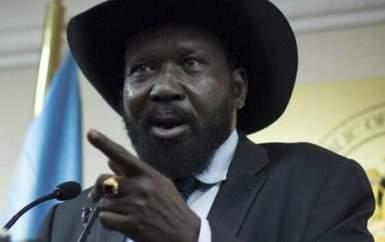South Sudan president denies forming private army: spokesperson
February 19, 2014 (JUBA) – South Sudanese president Salva Kiir was not forming a private army when he allowed for the mobilisation of youths for the purposes of creating a national reserve force, his spokesperson said.

Ateny was reacting to a report by Sudan Tribune in which Kiir was quoted at a political function as saying the purpose of the recruitment drive was for youths to serve as a “reserve force”.
Kiir made the admission on Saturday at an event organised by the youth wing of his governing Sudan People’s Liberation Movement (SPLM).
According to Ateny, the national call to service was issued in the aftermath of the 2012 Panthou (Heglig) conflict in which forces from the South Sudan army (SPLA) occupied the oil-producing area for 10 days before it was recaptured by Sudan. Ateny said that those who responded to the call were provided military training for the purposes of joining the national army.
“It appears some people did not like the idea, simply because the group was from the region which was not their own. They started to oppose it, though the idea was not bad. The intention was to make a reserve national force to be commanded by anybody,”Ateny said.
Speaking at Saturday’s youth function, Kiir defended the decision, saying a reserve force was a necessary line of defence in case of military difficulties.
He accused opponents of the force of denying the new recruits their salaries and weapons during training.
Youths recruited into the reserve force are widely believed to have played a key role in ethnic killings in Juba after the country was engulfed in violence following clashes between rival factions within the presidential guards on 15 December.
Critics of the president have questioned why the recruitment drive only targeted members of one ethnic group.
The SPLA’s chief of general staff has always distanced himself from questions surrounding the legality of the group, as have most members of the national legislative assembly.
(ST)
